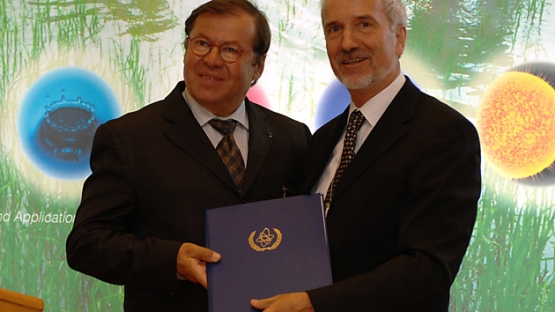An agreement was signed today between the IAEA and France´s "Institut de Researche pour le Développment (IRD)" for co-operation in the use of nuclear techniques to address the needs of developing nations. The agreement is seen as a building block to foster coordination and develop synergies between the two institutions in areas such as pest control, soil erosion and management, as well as agricultural water management.
The IAEA and IRD are already working together on a sterile insect technique (SIT) project aimed at fighting Malaria, Dengue and Chikungunya in the French island of La Réunion in the Indian Ocean. A collaboration project also involving France´s Centre de cooperation internationale en recherche agronomique pour le développement (CIRAD) to fight the tsetse fly in West Africa is also ongoing. Today´s agreement is aimed at extending this cooperation to the use of radionuclides and stable isotopes to improve crop productivity and water use efficiency.
"We are formalizing this partnership with IRD, a key institution that brings significant scientific capacity, experience and resources for addressing key development problems. The first concrete area of cooperation we have discussed is the use of SIT for controlling Malaria transmitting mosquitoes," said Werner Burkart, IAEA´s Deputy Director General and Head of the Department of Nuclear Sciences and Applications.
"Two other areas where we look forward to an exciting IAEA-IRD collaboration are the areas of soil erosion and soil management and agricultural water management. Specifically, we are interested in the development of soil management technology packages to enhance soil quality and land productivity in response to changes in land use and farming practices. A second area of interest is the management of irrigation water and soil organic matter for enhancing crop water productivity with more crops per drop and no water wastage from the plant-growing areas under both rainfed and irrigated conditions," concluded Burkart.
François-Xavier Deniau, France Ambassador to the IAEA, welcomed the agreement as a positive development for both institutions. "Cooperation between this French institute and the IAEA in issues such as SIT will be beneficial to both parties. The IAEA has a particular expertise in this area, which complements the French approach to tackling diseases such as Chikungunya and Malaria," he said.
IRD President Jean François Girard spoke of the importance of international cooperation in the effort to improve living conditions in the developing world. "Research, science and innovation are conditions of development. In health, intergovernmental organizations such as the IAEA and national research institutes such as the IRD must collaborate, combining our joint expertise to promote science - particularly in countries in the southern hemisphere - in order to address the needs of developing nations," he said.
The agreement deal between the IAEA and IRD was signed during the IAEA´s 52nd General Conference which is being held in Vienna, Austria, from 29 September - 4 October 2009.
Background
Founded in 1944, the "Institut de Recherche pour le Développement" is a French public research institute working exclusively for the development of Southern countries. It operates under the joint authority of the French Ministries responsible for research and for overseas development. Its work focuses on the relationship between humans and their environment.


